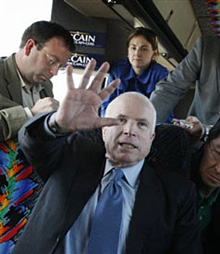
|  |  |  Editorials | Opinions | September 2008 Editorials | Opinions | September 2008  
Earth to McCain: It's a Crisis
 Robert Scheer - Truthdig Robert Scheer - Truthdig
go to original


| | On the economy - the main issue of the 2008 election - Obama gets it and McCain does not, according to Robert Scheer. (Joe Raedle/Getty Images) | | |
Gag me with a spoon, as Valley girls used to say. Did you see that McCain-Palin ad promising "tougher rules on Wall Street to protect your life savings, no special interest giveaways"? Just how dumb do they think we are?

Seriously, 20 minutes of Google searches should be sufficient to convince all but the dimwits among us that John McCain has been a master of the special-interest giveaways to Wall Street that enabled this meltdown. He voted for abolishing all of the significant rules put in place at the time of the Great Depression designed to prevent a repeat. The two main bills accomplishing that, bills which McCain enthusiastically supported, were the Commodity Futures Modernization Act and the Gramm-Leach-Bliley Act. The Gramm is former Sen. Phil Gramm, who was chair of the Senate Banking Committee when he acted as chief sponsor of both pieces of legislation. The same Gramm that McCain picked to co-chair his presidential campaign.

Gramm proved an embarrassment when he cavalierly insisted there was no real crisis but only the panic of "whiners," but even on Monday as his "Crisis" ad ran, McCain, in person, was still denying that there was one. "The fundamentals of our economy are strong," he told NBC's Matt Lauer, as two more of the nation's most venerable financial institutions crashed and the stock market shed more than 500 points. When a perplexed Lauer asked McCain to square his optimism with his own ad's use of the crisis word, McCain came to his senses and, discovering his inner Karl Marx, insisted he hadn't been speaking of the bankers but rather was saying "that the workers of America are the fundamentals of the economy."

OK, but never heard that from him before, as he consistently carried water for the bankers going back to his supporting role in the savings and loan scandal, a harbinger of the consequences of a severely deregulated financial market that McCain still favors. Nor did he worry then about the workers who lost their savings while McCain's wife made a million in profit from her deal with Charles Keating, the banker for whom McCain lobbied. Even on Tuesday, while McCain suddenly was thundering against the "unbridled corruption and greed that caused the crisis on Wall Street," he still did not urge anything more stringent than convening a national commission.

Barack Obama has been way ahead of McCain in grasping the severity of the problem and back in March offered a scorching criticism of the deregulation mania, in particular the Gramm-Leach-Bliley law, which allowed the stockbrokers, insurance companies and banks to merge for the first time since the 1930s, ushering in this era of irresponsibility. But that was in the primaries, and now he has turned for advice to Robert Rubin and Lawrence Summers, who both served as treasury secretaries in the Clinton administration and talked the president into signing that wretched legislation.

As recently as Jan. 31, Rubin, by then Citigroup's executive committee chair, was, like McCain until Tuesday, still in denial on the meltdown, insisting it was merely "all part of a cycle of periodic excess leading to periodic disruption." Fortunately, at that time he was an adviser to Hillary Clinton and remained so past March 27, when Obama delivered his main economic speech blaming for the meltdown the Gramm deregulation that Rubin had helped make law. Referring to the repeal of the Depression-era regulations, Obama stated all too correctly: "Unfortunately, instead of establishing a 21st century regulatory framework, we simply dismantled the old one-aided by a legal but corrupt bargain in which campaign money all too often shaped policy and watered down oversight. In doing so, we encouraged a winner-take-all, anything-goes environment that helped foster devastating dislocations in our economy."

Not devastating for Rubin and Citigroup, where Rubin went to work, and which was a leader in that $300-million lobbying effort and the first huge beneficiary of the new law that permitted a merger with Travelers Insurance that previously had been illegal.

So, yes, there is a world of difference between Obama and McCain on the main issue that now challenges the American way of life, in which people's homes, retirement, kids' college education and all other dreams are threatened by a mindless deregulation led by the Republicans but which too many influential Democrats supported. What Obama needs to do, both to win and to help save the country, is denounce the whole lot of those scoundrels from both parties and rediscover his populist voice.

Robert Scheer is author of a new book, "The Pornography of Power: How Defense Hawks Hijacked 9/11 and Weakened America." |

 |
|  |



